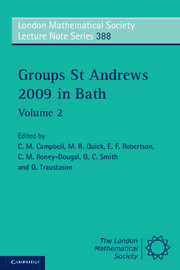Book contents
- Frontmatter
- Contents
- Introduction
- Algorithms for matrix groups
- Residual properties of 1-relator groups
- Words and groups
- The modular isomorphism problem for the groups of order 512
- Recent progress in the symmetric generation of groups
- Discriminating groups: a comprehensive overview
- Extending the Kegel Wielandt theorem through π-decomposable groups
- On the prime graph of a finite group
- Applications of Lie rings with finite cyclic grading
- Pronormal subgroups and transitivity of some subgroup properties
- On Engel and positive laws
- Maximal subgroups of odd index in finite groups with simple classical socle
- Some classic and nearly classic problems on varieties of groups
- Generalizations of the Sylow theorem
- Engel groups
- Lie methods in Engel groups
- On the degree of commutativity of p-groups of maximal class
- Class preserving automorphisms of finite p-groups: a survey
- Symmetric colorings of finite groups
- References
Extending the Kegel Wielandt theorem through π-decomposable groups
Published online by Cambridge University Press: 05 July 2011
- Frontmatter
- Contents
- Introduction
- Algorithms for matrix groups
- Residual properties of 1-relator groups
- Words and groups
- The modular isomorphism problem for the groups of order 512
- Recent progress in the symmetric generation of groups
- Discriminating groups: a comprehensive overview
- Extending the Kegel Wielandt theorem through π-decomposable groups
- On the prime graph of a finite group
- Applications of Lie rings with finite cyclic grading
- Pronormal subgroups and transitivity of some subgroup properties
- On Engel and positive laws
- Maximal subgroups of odd index in finite groups with simple classical socle
- Some classic and nearly classic problems on varieties of groups
- Generalizations of the Sylow theorem
- Engel groups
- Lie methods in Engel groups
- On the degree of commutativity of p-groups of maximal class
- Class preserving automorphisms of finite p-groups: a survey
- Symmetric colorings of finite groups
- References
Summary
Abstract
A celebrated theorem of Kegel and Wielandt asserts the solubility of a finite group which is the product of two nilpotent subgroups. In this survey we report on some extensions of this result by considering π-decomposable subgroups, for a set of primes π, instead of nilpotent groups.
Introduction
The study of groups which can be factorised as the product of two subgroups has developed extensively in recent decades. The general aim is to obtain information about the structure of the whole group from the structure of the subgroups in the factorization, and vice versa. An example is the well known theorem of Kegel and Wielandt which establishes the solubility of a finite group factorised as the product of two nilpotent subgroups. This result has been the motivation for a wide variety of results in the literature. In particular some of them consider the situation when either one or both of the factors are π-decomposable, for a set of primes π. This paper is a survey article containing a detailed account of recent achievements which extend the Kegel–Wielandt theorem in this direction.
Only finite groups are considered in this paper.
Let us start with an explicit statement of the starting point of our development:
Theorem 1.1 (Kegel [14] and Wielandt [19])If the group G = AB is the product of two nilpotent subgroups A and B, then G is soluble.
- Type
- Chapter
- Information
- Groups St Andrews 2009 in Bath , pp. 415 - 423Publisher: Cambridge University PressPrint publication year: 2011
References
- 2
- Cited by

